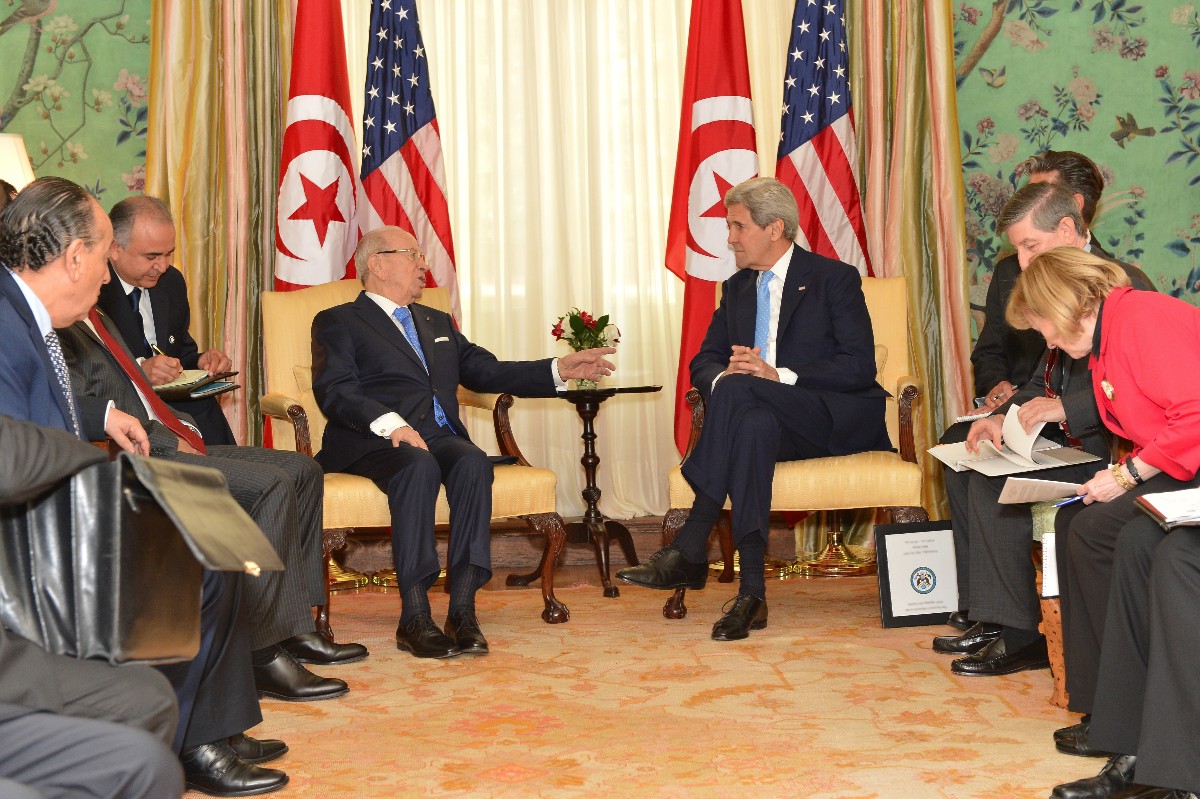 Secretary Kerry and Tunisian President Essebsi via State Dept
Secretary Kerry and Tunisian President Essebsi via State Dept
A State of Emergency: Tunisia’s New Anti-terror Law and Wall
On July 31st, Tunisian President Beji Caid Essebsi extended the nation’s state of emergency for another two months. With two large-scale terror attacks against foreign nationals since March, President Essebsi and the legislative body have taken a firmer role against terrorist threats. Along with placing the nation under a state of emergency, the government has recently passed an anti-terror law and proposed establishing an “anti-terror” wall to tackle insurgent forces.
Under the state of emergency, there will be increased surveillance and security measures to better protect tourist sites. Although Tunisia’s laws state that the government must refrain from expanding the areas in which the army can operate, the president is given executive authority under these circumstances.
In order to renew confidence in the country’s safety, the Tunisian Parliament also adopted an anti-terror law in late July. Having faced no major opposition, the law replaces legislation passed in 2003 under the dictatorship of Zine El Abidine Ben Ali. Although the previous law upheld draconian forms of punishment against opposition, some consider the current reforms not far removed from its predecessor.
Considered by some as a “real threat to rights and liberties in Tunisia,” the anti-terror law resurrects the death penalty, permits phone-tapping, and authorizes detention of suspects for 15 days without access to a lawyer. Additionally, it has been noted that the law has been too vague when it comes to the definition of terrorist crimes. One major point of concern underscores how even vocalizing support for terrorism can be considered a jailable offense.
However, this law represents the first major test of Tunisia’s new democratic constitution that was developed last year. The law serves as an opportunity to tackle legitimate threats to national security rather than targeting any form of opposition. Additionally, as Tunisia’s economy has been badly hit since these terrorist attacks (tourism revenue makes up 15% of national income), government forces will need the support of the public to proactively target leaders of terrorist networks in order keep the Tunisian tourism industry—and one major source of their citizens’ income—afloat.
Taking further action against the terrorist threat, Tunisia aims to complete an anti-terror wall by the end of this year. The wall will secure one third of the country’s shared border with Libya. Currently, the chaos in Libya serves as the greatest threat to Tunisia as the Islamic State has established a formidable presence throughout the civil war ravaged country. In the wake of Tunisia’s declining tourism industry, it is also feared that unemployed youth may succumb to financial promises across the border and train with the Islamic State or al Qaeda.
As of yet, the Islamic State has not given a reason as to why Tunisia has been targeted with these attacks. However, it is assumed that the North African country’s record as the only Arab state to make a notable transition to democracy after the Arab Spring has prompted these terrorist operations. With a constitution based on consensus and allowing free and fair elections, Tunisia offers a possible model of change throughout the post 2011 Arab world.
While it is uncertain how long Tunisia will have to be alert against the rising terrorist threat—and how effective these preventative measures will be—it is commendable that Tunis has initiated legislative and pragmatic measures to ensure the safety of both their citizens and visitors to their country. If these measures prove to be successful, Tunisia will provide other countries an effective model to combat the influence of the Islamic State and further reinforce the resilience of democratic progress in a largely authoritarian region.





